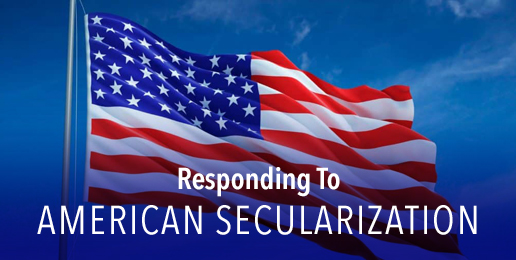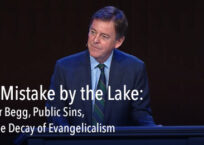
It’s a topic that’s showing up more and more in books, thought pieces, news outlets, podcasts, and blogs, inside and outside the church: the secularization of America.
Pew Research and Gallup (to name a few) have recently highlighted the rise of the “nones” (religiously unaffiliated) across the nation, specifically in the last several years.
Now, the fact that America is secularizing isn’t up for debate and honestly, shouldn’t surprise anyone, especially believers.
All we need to do is scan the cultural landscape, scroll social media, or observe government agendas to know that Biblical values don’t hold the sway they once did. What is perhaps more concerning and less expected is the data that shows the “nones” aren’t comprised solely of people who never identified with or attended a certain church.
These numbers include those who are leaving; those raised in the church and now no longer identifying with a specific church or faith community, otherwise known as the “dechurched.”
According to The Great DeChurching, a new book by pastors Jim Davis and Michael Graham, 40 million Americans have stopped going to church in the last 25 years. I will admit I have not yet read the book, but I have my own theories about the “why,” specifically. I believe the “dechurching” we are seeing is not the result of a single development but rather the concurrence of several factors; a “perfect storm,” if you will.
As a Millennial, I have had a front-row seat to the massive religious and cultural shifts that have characterized the last several decades in our nation. When I think of my now-dechurched peers, disillusionment characterizes their experiences.
From the ongoing shockwaves of the sexual revolution that wrought a runaway increase in divorce, the decentralization of the family, the elevation of radical self-expression, and the acceptance of same-sex marriage (to name just a few) to the disillusionment of 9/11 and the War on Terror, a loss of trust in authority (church and otherwise), the march of globalization, the fear, isolation, and ideological division of a global pandemic, and tension over racial, economic, and political differences, it’s no wonder skepticism is high, while stability is increasingly found in “chosen family” and “tribes” rather than in a church.
We could point the finger at Hollywood and pop culture as the sirens who have drawn people away from the church, and that would be partially true.
But it’s not the whole story. The church has contributed to her own losses.
Raised in a Christian home and church during the 90s, I’m sad to say I can speak directly to both the shallowness of much of my “discipleship” within a youth group context and the fallout I’ve seen among many of my peers.
While we were playing dumb games with shaving cream, acting out demon-versus-angel skits to popular CCM songs, and having “mountaintop” spiritual experiences on retreats, our roots were anything but deep. Unsurprisingly, roughly half of my old church friends have since “deconstructed” or “dechurched,” and for many of the reasons I stated above.
At some point, they couldn’t reconcile the God of the Bible with what they saw both inside and outside of the church, and rather than do the hard work of discipleship, they simply gave up.
Not long ago, it occurred to me that there’s a good chance that some of my “dechurched” friends never actually knew Jesus as their Savior. While that points to failures within our childhood churches and homes, it also gives me hope that they still may come to Christ for the first time.
In a late August episode of The Briefing, Albert Mohler allowed that “dechurching” ought to trouble believers, but he also tempered that response with the truth that with these sorts of sweeping conclusions, definitions and context matter.
As Mohler (and Daniel Darling, in another article) point out, many of those who have left the church still believe the tenets of the faith and so this data appears to be more “about belonging, not so much believing,” but, Mohler goes on,
“as Christians, we understand those two are inextricably linked, or at least, we have to insist they are.”
If there’s anything media representations of Christians have shown us, especially in recent years, it’s that there are many people who are categorized as “evangelicals” who don’t actually attend church regularly, read the Bible regularly, or believe the Bible is inerrant. According to a survey sent out by Family Research Council, only 6% of American adults have a Christian Worldview!
It is interesting to note that this trend is alarming enough for even secular observers to take the time and effort to write about it. In a recent New York Times opinion piece by Nicholas Kristof entitled, “America Is Losing Religious Faith,” Kristof decries the societal effects of a loss of faith in our nation.
To be sure, the loss of services provided by churches and believers (such as food pantries, hospitals, adoption and foster care agencies, etc.), and the link to an increase in fatherlessness and divorce, among other attendant repercussions, represent real threats to vulnerable Americans. We should pray that more intellectually honest liberals like Kristof sound the alarm (and respond to the Holy Spirit!) as they recognize the good that comes from adherence to biblical faith.
So as believers, what ought our response be? For starters, we should recognize that perhaps what’s been revealed in especially the last several years of upheaval and instability is who the real Christians are. As Mohler points out, when we’ve had interruptions to our society (like the COVID-19 pandemic),
“you pretty much find out where the serious believers are.”
This is a sobering thought, but acknowledging that a “sifting” is taking place should also be a cause for hope and renewed purpose. We also ought to recognize the blame much of the American church bears for raising up whole generations of people who “prayed the prayer” but weren’t properly discipled.
As a Millennial who made it through to adulthood with her faith intact and deepened, I believe there are a few essentials to turning this tide:
First, we must take discipleship seriously, for ourselves and for our children (which we should have more, not less of!).
Second, we must learn and exercise what Scripture says about what’s going on culturally and in the world around us.
And third, we must come to see our place in the church properly, live counterculturally, and joyfully share the true gospel – not an Americanized version of cultural Christianity – with those around us.
Yes, the nation is secularizing, but the trend need not be permanent. Even if it is, we can and should be thankful for the clarity this shaking affords us and the opportunity it gives for us to witness to a largely lost nation.
For many, the data is bearing out what we already suspected was happening here in America. Rather than longing for the “good old days,” let’s trust that God put us here, at this time, on purpose (Eph 2:10; Ps 139:16; Acts 17:26).
We are not the first believers to find themselves in a minority, but we can trust that God has always preserved for Himself a remnant (Mic 7:18; Rom 11:5; Rev 14:12), that He is bringing many to Himself (John 12:32; Jas 4:8; John 3:16-17), and that He will be glorified (Matt 5:16; Isa 40:5; Phil 2:11).























